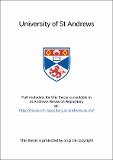Spatial thought and active experience
Abstract
In the following thesis I attempt to argue that some form of activity is necessary if a subject is to be able to partake in spatial thought and undergo conceptual, spatial experience. I approach this issue by considering a thought experiment of Galen Strawson, concerning the passive creatures that he calls the 'Weather Watchers', and by attempting to demonstrate that such passive creatures could not meet certain requirements necessary for conceptual spatial awareness. I argue against the idea that such passive beings could possess spatial concepts by employing certain transcendental arguments that connect the possession of particular concepts to the having of certain sorts of experience. More specifically, I claim that in order to view oneself as located in space and to make sense of the causal relations holding between oneself and other spatial items, one must possess the concept of a material object. I argue that the possession of this concept is only available to those subjects able to actively interact in certain ways with other objects. Next, I argue that the ability to grasp the distinction between veridical and non-veridical experience is essential if one is to grasp that one's perceptual experience represents something other than one's own states, and that a passive subject will have no means by which it might achieve such a grasp. Parallels are drawn between this approach and that of P. F. Strawson and Gareth Evans. Finally, I attempt to demonstrate that the spatial content of sensation alone is inadequate for full conceptual, spatial awareness. This section draws upon Brian O'Shaughnessy's work on the body image.
Type
Thesis, PhD Doctor of Philosopy
Collections
Items in the St Andrews Research Repository are protected by copyright, with all rights reserved, unless otherwise indicated.

